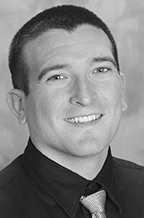University classrooms must be a place students can learn to have conversations with those who have different opinions or beliefs. Even though sometimes those differences can be uncomfortable, they are part of learning, a University of Wisconsin-Stout professor believes.
 “If we do not teach students how to have those conversations in the classroom, they will not be able to have those conversations outside the classroom,” said Daniel Ruefman, associate professor in the English and philosophy department. “They need the tools in their toolbox to have those conversations outside the safety of the classroom.”
“If we do not teach students how to have those conversations in the classroom, they will not be able to have those conversations outside the classroom,” said Daniel Ruefman, associate professor in the English and philosophy department. “They need the tools in their toolbox to have those conversations outside the safety of the classroom.”
Ruefman said he encourages empathy between students to have them to connect with one another. “I think that’s where we went wrong with the 2016 election,” Ruefman said, referring to the presidential race with President Donald Trump versus Democratic challenger Hillary Clinton. “We had candidates who weren’t really good about putting themselves in other peoples’ shoes.
“Empathy is something our students are losing,” he added. “That’s because we aren’t modeling that behavior to them. They are becoming trolls on social media. It becomes about the quippy phrases and the got-you phrases. We need to reconnect as human beings. When you are truly fostering relationships, you begin to develop new perspectives.”
Ruefman was one of the respondents during the second annual UW-Stout Civil Liberties Symposium held March 18-19. Ruefman and Rickie Ann Legleitner, UW-Stout assistant professor in the English and philosophy department, spoke during a presentation “Facilitating Difficult Discussions: Politics and Free Speech in the Classroom.” Nine sessions were held over the two days, including on black voting rights in the U.S.; biopolitics of food; civil liberties; and civil rights.
The symposium was sponsored by the UW-Stout Center for the Study of Institutions and Innovation. The center started in fall 2017 through a Charles Koch Foundation award. The intent of the center is to facilitate civil and rational debate and research in the state and beyond on important civil liberties guaranteed in the U.S. Constitution.
 Legleitner acknowledged that some classroom discussions can be difficult. Instructors may want to avoid controversial topics, she said, to prevent being targeted on watch lists or receiving bad reviews on internet professor rating sites or on student evaluations. Those evaluations can be tied to tenure and keeping their jobs.
Legleitner acknowledged that some classroom discussions can be difficult. Instructors may want to avoid controversial topics, she said, to prevent being targeted on watch lists or receiving bad reviews on internet professor rating sites or on student evaluations. Those evaluations can be tied to tenure and keeping their jobs.
“Since the 2016 elections certain topics have become very politicized,” she said, noting she encourages open discussion about all kinds of topics in her classes, which include women and gender studies. In a class syllabus she notes right away that she wants to promote discussion in the classroom; all students should feel free to express their opinions but must remain respectful and civil to others.
“I want you to think for yourself and support that,” Legleitner said of her students. “Show me you thought it through.”
She encourages questions from students and validates their comments, asking for their reasoning and evidence. "I encourage students to debate and offer alternative viewpoints,” Legleitner said “Looking at the First Amendment and discussing free speech can help facilitate these discussions. We shouldn't avoid hot button and political issues."
Many students are in their own social media bubbles and have isolated viewpoints, but open dialogue encourages everyone to have a voice. “I emphasize feeling uncomfortable is a part of the learning process,” she noted.
UW-Stout is Wisconsin’s Polytechnic University, with a focus on applied learning, collaboration with business and industry, and career outcomes.
###
Photos
Daniel Ruefman
Rickie-Ann Legleitner




